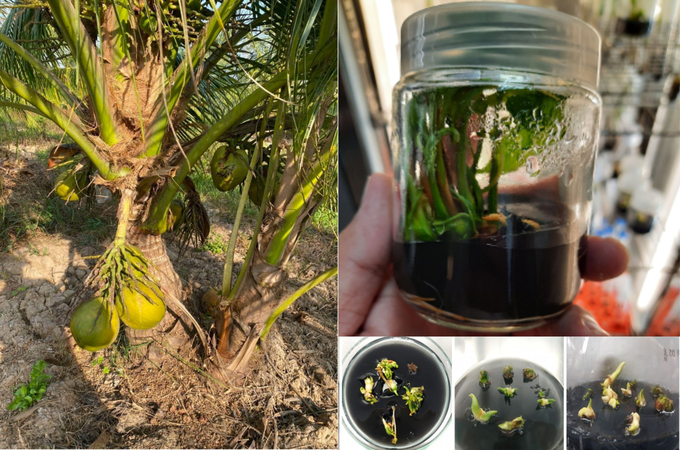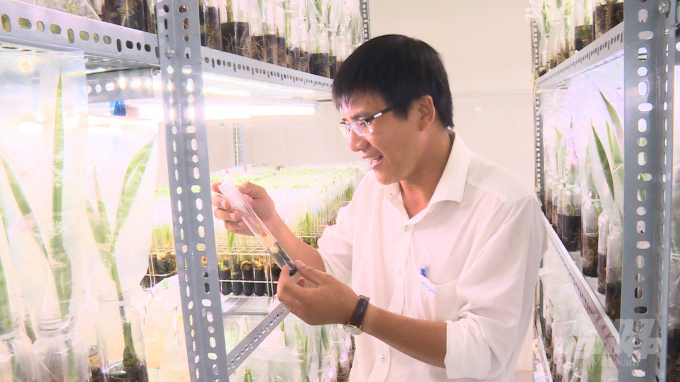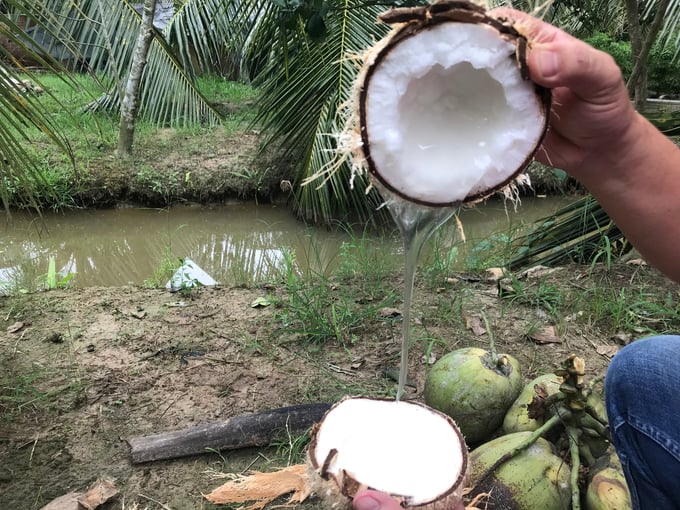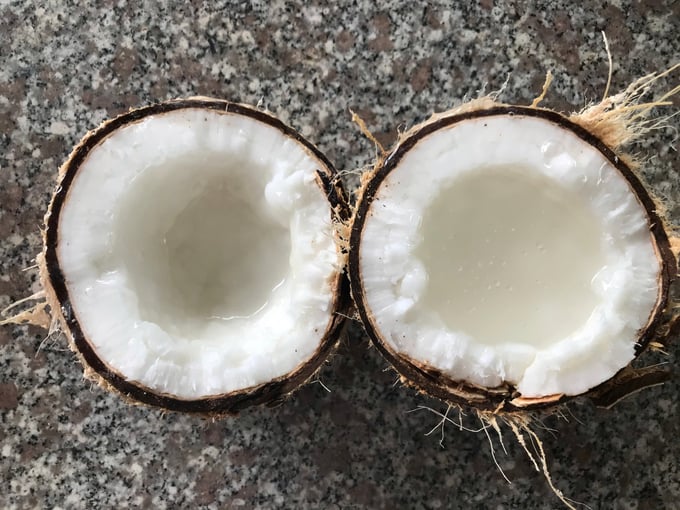May 25, 2025 | 23:18 GMT +7
May 25, 2025 | 23:18 GMT +7
Hotline: 0913.378.918
May 25, 2025 | 23:18 GMT +7
Hotline: 0913.378.918

After three years of cultivation, tissue-cultured wax coconut trees have produced fruit. Photo: Minh Dam.
Wax coconut is a specialty fruit of Tra Vinh province, known for its high economic value and strong contribution to the province’s brand. Compared to regular coconuts, wax coconuts are distinguished by their thicker flesh, higher oil and nutritional content, and their distinct aroma.
However, according to Mr. Nguyen Ngoc Trai, Acting Director of the Center for Applied Biology (Faculty of Agriculture and Aquaculture, Tra Vinh University), wax coconuts cannot naturally germinate due to their genetic characteristics. As a result, traditional methods of propagation using seedlings from non-wax coconuts yield a maximum wax coconut rate of only 25%.
To address this issue, scientists at Tra Vinh University have, in recent years, continuously improved the process of cultivating wax coconut embryos. This process has achieved an 85% or higher wax fruit-to-bunch ratio. The University’s embryo-based propagation technique, with a success rate of 63% (63 trees from 100 embryos), has been registered for intellectual property protection. Since 2011, these seedlings have been commercialized, receiving positive feedback from customers. Each year, the University transfers approximately 5,000 embryo-based wax coconut seedlings to producers, significantly enhancing economic returns for farmers.

The first tissue-cultured wax coconut tree at Tra Vinh University has produced quite a lot of fruit after 3 years of planting. Photo: Minh Dam.
Mr. Nguyen Van Su, Chairman of the Board of Directors of Hoa Tan Wax Coconut Cooperative in Cau Ke District, Tra Vinh Province, shared that wax coconut trees follow the same fruiting cycle as regular coconuts, with one bunch harvested each month.
Currently, the price of grade I wax coconuts is 100,000 VND per fruit, and grade II coconuts sell for 60,000 VND per fruit. The economic return from traditional wax coconut cultivation is around 100 million VND per hectare. However, for embryo-cultured coconuts, production efficiency can increase 10 to 20 times compared to normal coconuts and 5 to 10 times compared to traditional wax coconuts.
"Traders now buy wax coconuts based on quality, without distinguishing between traditional and embryo-cultured coconuts. The high profitability of embryo-cultured wax coconuts has encouraged members of the Cooperative to transition to this type of cultivation gradually. Farmers are removing inefficient coconut trees, such as those with small or aging fruits, and replanting the land with embryo-cultured coconut trees. For instance, my family invested 24 million VND to buy 30 embryo-cultured coconut trees to plant in our garden," shared Mr. Su.

Mr. Nguyen Ngoc Trai noted that scientists from Tra Vinh University have successfully propagated wax coconuts through tissue culture, achieving an initial multiplication rate of about 30. Photo: Minh Dam.
According to Mr. Su, the current price of embryo-cultured wax coconut seedlings is quite high, ranging from 800,000 to 1.2 million VND per tree, depending on the production site. This slows the renovation process for wax coconut farms, as the high seedling cost hampers the transition to specialized cultivation of embryo-cultured wax coconuts. Specifically, seedlings from Tra Vinh University are priced between 700,000 and 800,000 VND per tree, depending on the quantity ordered. Thus, research into new methods to produce high-quality, low-cost wax coconut seedlings is crucial to meet farmers' needs.
In addition to the progress made in embryo culture, Tra Vinh University has been approved by the Ministry of Agriculture and Rural Development to implement the key ministerial-level project "Research on Coconut Propagation Using Cell Tissue Culture Technology and Intensive Cultivation Techniques for Tissue-Cultured Coconut." The project, with a budget of 10.5 billion VND, is being implemented from 2017 to 2022 (Phase 1).
Compared to the embryo culture method, wax coconut tissue culture is a much more complex process. However, seedlings produced through tissue culture are genetically uniform and retain the desirable traits of the parent plant.

Wax coconut has a thick flesh, higher oil and nutritional content than regular coconut and a distinctive aroma. Photo: Minh Dam.
Mr. Nguyen Ngoc Trai shared that scientists from the Faculty of Agriculture and Fisheries (Tra Vinh University) have collaborated with the research team from the National Key Laboratory of Plant Cell Tissue Culture (Institute of Agricultural Genetics) to carry out the project. The project aims to research and apply plant cell tissue culture technology to create tissue-cultured wax coconut seedlings through the formation of asexual embryos.
After five years of research, scientists have successfully identified the appropriate materials and environments to induce callus, differentiate asexual embryos, and regenerate seedlings. Simultaneously, they have developed a process for planting and nurturing in vitro asexual coconut trees in greenhouses and nurseries. The project has resulted in the production of 300 in vitro wax coconut seedlings and 200 tissue-cultured wax coconut trees in the nursery.
This achievement marks a significant milestone, being the first research conducted in Vietnam on coconut tissue culture, specifically for wax coconuts. Experts from the Ministry of Agriculture and Rural Development's evaluation council highly praised the results, endorsing the project and recommending its continuation into phase 2. This next phase will focus on completing the cultivation process and assessing the adaptability of tissue-cultured wax coconut trees in Tra Vinh, as well as the quality of the wax fruit.

Wax coconut holds immense potential to evolve into a distinct and competitive product line for Tra Vinh province. Photo: Minh Dam.
The application of plant tissue culture for coconut breeding is a pressing need, one that many scientists, both domestic and international, are pursuing. However, at present, neither coconut trees in general nor wax coconut trees specifically produced by tissue culture methods have been commercialized. Tra Vinh University is one of the pioneers in the field of wax coconut breeding. The success of phase 1 has provided great encouragement for the University’s scientists to continue their research.
However, Mr. Nguyen Ngoc Trai also noted that the multiplication rate of the tissue culture method for wax coconuts in phase 1 remains relatively low, with the highest rate being just 30. To bring these research results into practical production, it is essential to continue with phase 2. This phase will focus on perfecting the process, increasing the multiplication rate to 50 (where one initial sample can produce 50 wax coconut seedlings), and creating high-quality, genetically uniform seedlings. The goal is to scale up production of tissue-cultured wax coconut seedlings to an industrial level, thereby reducing the cost of seedlings to under 100,000 VND per tree. This will allow more farmers to access the seedlings, positioning Tra Vinh's wax coconut as a commodity that can be exported in large quantities in the near future.
Tissue-cultured wax coconut trees have already been tested at the Experimental Cultivation Area of Tra Vinh University. After three years of cultivation, these trees have demonstrated robust growth, successfully adapting to the climate and soil conditions in Tra Vinh province. They are now producing wax fruits with thick flesh and excellent quality.
Translated by Quynh Chi
/2025/05/25/4127-3-073637_820.jpg)
(VAN) Thanks to the promotion from an FAO-implemented project, vegetable production in greenhouses in Moc Chau has seen strong development, from 1.5 hectares in 2021 to nearly 50 hectares in 2024.

(VAN) FAO has recently supported USD 140,000 to implement the project 'Risk mitigation human-animal interface risks through disease control initiatives in pig farming.'

(VAN) The People's Committee of Tra Vinh province has approved an adjustment to the investment policy for the Green Hydrogen Plant project, increasing its area to approximately 52.76 hectares.
![Reducing emissions from rice fields: [2] Farmers’ commitment to the soil](https://t.ex-cdn.com/nongnghiepmoitruong.vn/608w/files/news/2025/05/05/dsc08881jpg-nongnghiep-140632.jpg)
(VAN) Clean rice cultivation model in Thuong Tan commune, Bac Tan Uyen district, is assisting local residents in achieving sustainable agriculture by substantially reducing costs, increasing productivity, and protecting the environment.

(VAN) At the conference to disseminate Resolution No. 68, AgriS introduced its digital agricultural ecosystem and reaffirmed its commitment to accompanying the Government in promoting private sector development and sustainable agriculture.

(VAN) 'Blue Ocean - Blue Foods' initiative is designed to restore marine ecosystems and establish sustainable livelihoods for local communities by cultivating a minimum of 1,000 hectares of cottonii seaweed in the first three years.
/2025/05/21/4642-3-112707_603.jpg)
(VAN) The V-SCOPE project has made direct contributions to three out of six pillars of the Comprehensive Strategic Partnership between Vietnam and Australia.